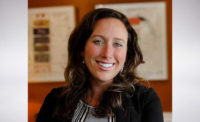Name/Title/Company: Elizabeth Jedrlinic, client services leader, Trane
Age: 32
Educational Experience: Bachelor’s degree in environmental engineering, Johns Hopkins University
Organizational Affiliations/Achievements/Awards: ASHRAE Young Engineers in ASHRAE (YEA) Regional Vice Chair Region I, ASHRAE YEA Professional Development Subcommittee Chair, ASHRAE YEA Developing Leader Award, Research Subcommittee Chair, ASHRAE Technical Committee 2.5: Global Climate Change, Professional Women in Construction Membership Committee
What does your day-to-day job entail?
My days are dynamic because I am a sales manager. I currently have seven members on my sales team.
My mornings typically consist of short check-ins with my team where we discuss workload distributions, estimates and current bidding projects, project fulfillment, and engineering requests. These daily calls help us manage workloads and keep up with requests. Then, I often meet with other leadership to focus on topics, such as performance, team training plans, customer visits, customer events, etc.
I have one-on-ones once a month with each member of my team to discuss his or her goals, development, and any struggles that may be occurring. I also spend a lot of the day answering questions from my team on current projects, next steps, how to handle specific situations, any general questions they have about their roles, etc.
At least once a day I am involved in calls with customers to work through challenges, scheduling, project execution, price negotiation, and/or anything else the customer feels warrants leadership involvement.
Although I do my best to map out my day every morning, I’m also always prepared to adapt based on what may come up that day. Being a sales manager is not for everyone, but I enjoy that my job is fluid and knowing that every day will be different.
What caused you to/when did you fall in love with engineering?
I have always loved science and learning how and why things work. Growing up in New York, I found it fascinating that such an expansive city with such elaborate underground transportation could be built. Engineers seem to take on the most insane problems with such creativity. Someone was crazy enough to envision a building more than 100 floors, and then they figured out how to build it. They wanted to sail around the world, and then they designed a boat that could do it. This theme continues as time moves forward. I enjoy solving problems. I did not know exactly what a career in engineering entailed, or just how many paths were available, but I knew it was where I wanted to be.
What has been the most rewarding/proudest aspect of your engineering career?
The most rewarding part of my career so far is the impact I can have on my team and for my company in my new role. All the members of my team have great talent and potential, and seeing them succeed is far more rewarding than anything I’ve accomplished on my own. I never want to be the reason someone does not want to come to work or does not like their job. I think being a good leader that members of my team feel they can rely on is the best part of my career so far.
What challenges do women face in this profession? Can you give a personal example? Why aren’t there more women in engineering? How can we increase the number of women in engineering?
One of the largest challenges women face in this profession is the feeling of isolation. I am often the only woman in the room, which can be intimidating. Earlier in my career, I had the mindset that I needed to be perfect in every scenario to be taken seriously, which was very exhausting. I know there are countless challenges facing women, big and small, but there have been great strides made in recent years. The number of women graduating with engineering degrees is rising exponentially and increasing the exposure throughout the industry. If more young girls can see examples of women in engineering, it can lead to more interest in the field.
How many years have you been active in the HVAC industry? What’s changed the most in that time? What’s changed the least?
I have been working in the HVAC industry since I graduated college in 2013 and have been with Trane for 10 years. The most significant change I have seen is in the products and technology. These changes have been mostly driven by legislation. As the world focuses on climate change, the type of commercial HVAC designs have switched from water- or gas-based products to anything that will support decarbonization and electrification. Engineers not only have to think about how to build, heat, and cool a space but also about how to design for climatic events and meet codes and regulations that are eliminating systems we’ve historically used.
The part that has changed the least is the customers. I predominantly work with contractors in the tri-state area of New York, and they have always been the same. They are demanding but creative and always trying to get things done as quickly as possible. No matter what happens, they want the lowest price and the fastest lead time.
I understand you sort of created your own role/position at Trane. Tell us about this journey and how it unfolded.
I had been an account manager with Trane for eight years when I knew I was ready to take the next step in my career but felt the options were a little limited since I started my career in technical sales. I was trying to identify my favorite part of my job, and where I felt my skill set shined.
I’m incredibly lucky Trane is very supportive of my ASHRAE participation. ASHRAE is one of the largest professional organizations in our industry, and it offers a lot of learning, networking, and development opportunities for its members.
At the time, I was heavily involved in the YEA committee as well as working on the personal development committee. This committee planned all the ASHRAE Leadership Weekends and personal development seminars. I realized what I was enjoying the most was helping people in the industry build and develop their careers.
When I started to talk to my manager about how I felt I was particularly suited to focusing on development plans and helping people grow in their careers, my current role did not exist within Trane. I was beginning to feel stuck because while I loved working there, I was drained in the sales role, and I could not really see a future.
I’m lucky my manager really listened to me about where I wanted to go next. When the office started thinking about adapting our organizational structure to give newer employees more support and training, he saw the opportunity to incorporate what I had mentioned in our development discussions.
I was given the opportunity to plan and structure how the team would function and how I would lead. The team’s focus is centered around training and development. We’re aiming to prepare newer employees for more strategic, complex projects and the customers they will have in the future. The goal is to focus on training beyond the technical components to keep the professional and personal development growing as well.
What drives/motivates you every day?
I want to do meaningful work that has a positive impact. I also want to help other people achieve their goals.
What remains on your engineering bucket list — what do you aspire to do that you haven’t accomplished yet?
I have given many presentations on development and training at ASHRAE conferences and to other organizations, but I would love the opportunity to give a technical presentation to the industry. Sometimes, it can feel as if I’m not qualified since I work with such brilliant people who do incredible design work and are experts in their fields. I often have to remind myself that I answer technical questions every day and have solved problems in the field with engineers, contractors, and co-workers for 10 years.
What’s one thing no one knows about you?
Although I love the world of engineering, I am also an avid reader. It is a goal of mine to one day write a book, even if it is just for me.
List any mentors who’ve helped you succeed and describe precisely how they’ve shaped your success.
My parents. While they do not work in engineering, nor do they know much about engineering, they are my biggest role models and mentors. My whole work ethic derives from them, but, most importantly, I’ve never had to question whether I could achieve something. They instilled in me such strong self-worth and confidence that it never crossed my mind, which has been incredibly important as a female entering a male-dominated field.
Andrew Wallace, who is the current area contracting manager for Trane New York/Long Island, has been my co-worker, and then my manager, throughout my whole career. While we have very different styles, I’ve always felt like he understood my perspective and where I wanted to go in my career. I understand, now, how challenging it can be to mentor someone who may have different goals than you, and it was vital for me to have someone who supported and encouraged me as I walked through the many stages of my career. I can honestly say I would not be where I am today in my career without him.
What advice do you have for prospective female engineers considering entering the field?
The best advice I can give is to just keep pushing forward. Don’t ask permission or wait for someone to tell you what you should be doing. You may not always have examples of other women to help imagine your next step, but the field is growing, and if you want something, it’s there for the taking. This industry is very diverse in terms of career opportunities. Don’t limit yourself and follow your strengths.





